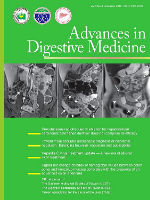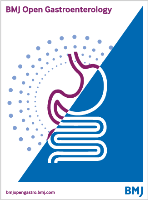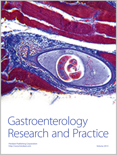
WORLD JOURNAL OF GASTROENTEROLOGY
Scope & Guideline
Championing high-quality studies in gastroenterology.
Introduction
Aims and Scopes
- Gastrointestinal Oncology:
Research on various gastrointestinal cancers, including gastric, colorectal, and pancreatic cancers, with a focus on novel therapeutic approaches, early detection, and prognostic factors. - Liver Diseases and Hepatology:
Studies related to liver diseases, including hepatitis, cirrhosis, and hepatocellular carcinoma, exploring pathophysiology, treatment strategies, and management guidelines. - Gut Microbiota and Its Impact on Health:
Investigations into the role of gut microbiota in health and disease, particularly its implications for metabolic disorders, inflammatory bowel disease, and gastrointestinal cancers. - Endoscopy and Minimally Invasive Techniques:
Advancements in endoscopic techniques for diagnosis and treatment of gastrointestinal disorders, including endoscopic resection and ultrasound-guided interventions. - Autoimmune and Inflammatory Bowel Diseases:
Research focused on autoimmune conditions affecting the gastrointestinal tract, including Crohn's disease and ulcerative colitis, examining their pathogenesis, treatment options, and patient management. - Nutrition and Metabolism in Gastroenterology:
Studies on the influence of diet and nutrition on gastrointestinal health, including the relationship between metabolic syndrome and liver diseases. - Emerging Technologies in Gastroenterology:
Exploration of cutting-edge technologies, including artificial intelligence and machine learning applications in diagnostic and therapeutic contexts within gastroenterology.
Trending and Emerging
- Precision Medicine in Gastroenterology:
There is a growing emphasis on precision medicine, with research focusing on personalized treatment strategies based on genetic, epigenetic, and microbiome profiles. - Artificial Intelligence and Machine Learning:
The integration of artificial intelligence and machine learning in diagnostics and treatment planning is a rapidly growing area, with studies exploring their applications in predicting disease outcomes and enhancing imaging techniques. - Gut-Brain Axis and Psychosomatic Interactions:
Emerging research on the gut-brain axis highlights the psychosomatic relationships between gastrointestinal health and mental well-being, indicating a shift towards holistic approaches in treatment. - Innovative Biomarkers for Disease Detection:
The search for novel biomarkers for early detection and monitoring of gastrointestinal diseases, particularly cancers, is trending, reflecting the need for more effective diagnostic tools. - Molecular Pathways in Disease Progression:
Research on molecular mechanisms and pathways involved in the progression of gastrointestinal diseases, including cancer and liver disorders, is gaining momentum as a means to identify new therapeutic targets. - Impact of COVID-19 on Gastrointestinal Health:
The journal has seen an increase in studies examining the impact of COVID-19 on gastrointestinal and liver health, addressing both direct viral effects and indirect consequences of the pandemic.
Declining or Waning
- Traditional Pharmacological Approaches:
There is a noticeable decrease in studies centered around traditional pharmacological treatments for gastrointestinal diseases, as newer therapies and personalized medicine approaches gain traction. - Basic Science Studies:
Research focusing solely on basic science without clinical application appears to be waning, as there is a stronger emphasis on translational research that bridges laboratory findings with clinical practice. - Surgical Techniques in Gastroenterology:
Although surgical interventions remain a critical area, the volume of studies specifically addressing traditional surgical techniques has diminished, possibly due to the growing interest in less invasive methods. - General Epidemiological Studies:
General epidemiological studies on gastrointestinal diseases are becoming less frequent, as more targeted research focusing on specific populations or conditions is favored.
Similar Journals

ACTA GASTRO-ENTEROLOGICA BELGICA
Transforming Research into Clinical PracticeACTA GASTRO-ENTEROLOGICA BELGICA is a prestigious journal dedicated to advancing the field of gastroenterology through the dissemination of high-quality research and clinical insights. Published by UNIVERSITE CATHOLIQUE DE LOUVAIN (UCL), this journal is an essential resource for researchers, healthcare professionals, and students alike, focusing on a wide range of topics including gastrointestinal diseases, treatments, and innovations in clinical practices. While the journal operates under a traditional access model, its impact in the academic community is significant, ensuring that vital research is communicated effectively to stakeholders in Belgium and beyond. With its commitment to academic excellence, ACTA GASTRO-ENTEROLOGICA BELGICA plays a crucial role in fostering high-level discourse and collaboration among experts in the field, ultimately encouraging advancements that improve patient care and outcomes.

DIGESTION
Elevating digestive health insights for a global audience.DIGESTION is a prestigious journal dedicated to advancing the field of gastroenterology, published by KARGER, a renowned publisher based in Switzerland. With a rich history dating back to 1896, this journal has continuously evolved and serves as a vital platform for researchers, professionals, and students alike. DIGESTION is recognized for its scholarly contributions, holding an impressive rank of 23 out of 167 in the Scopus database, placing it within the top 14% of gastroenterology journals, as evidenced by its Q2 classification. The journal's commitment to high-quality research is reflected in its wide-ranging scope, addressing various aspects of digestive health, clinical practices, and innovative therapies. Though not an open-access journal, it provides comprehensive access options that ensure the dissemination of crucial research findings to the global community. As we move towards 2024, DIGESTION continues to facilitate dialogue and insights in gastroenterological research, making it an indispensable resource for those in the field.

Clinical Gastroenterology and Hepatology
Bridging Science and Practice in Digestive HealthClinical Gastroenterology and Hepatology, published by Elsevier Science Inc, stands as a leading journal in the fields of gastroenterology and hepatology. With an ISSN of 1542-3565 and an E-ISSN of 1542-7714, this esteemed publication has earned its place in the top quartile (Q1) of both gastroenterology and hepatology categories as of 2023, ranking 6th out of 167 and 7th out of 82 respectively. The journal aims to disseminate innovative research, clinical studies, and case reports that advance the understanding and treatment of gastrointestinal and liver diseases. Targeted towards researchers, healthcare professionals, and students, it provides crucial insights into emerging therapies and medical advancements. Clinical Gastroenterology and Hepatology is not only a pivotal resource for contemporary gastroenterological research but also fosters collaboration and knowledge-sharing within the medical community. With a converging publication history from 2003 to the present, the journal continues to build on its solid foundation of scientific excellence and relevance.

Advances in Digestive Medicine
Unveiling Insights into Gastrointestinal DisordersAdvances in Digestive Medicine is a premier scholarly journal dedicated to the evolving field of gastrointestinal health and diseases. Published by WILEY, this journal aims to disseminate high-quality research encompassing a wide range of topics related to digestive medicine, from foundational studies to innovative clinical applications. As a significant resource for researchers, professionals, and students alike, Advances in Digestive Medicine fosters a deeper understanding of digestive disorders, promoting collaboration and knowledge exchange within the scientific community. Although it offers subscription-based access, the journal ensures comprehensive coverage of groundbreaking studies that significantly impact clinical practice and patient care in the field. With an ISSN of 2351-9797 and an E-ISSN of 2351-9800, it stands as an essential platform for anyone involved in digestive health research.

Cellular and Molecular Gastroenterology and Hepatology
Innovating solutions for tomorrow's clinical challenges.Cellular and Molecular Gastroenterology and Hepatology, published by Elsevier Inc, is a premier Open Access journal dedicated to advancing the understanding and treatment of gastrointestinal and liver diseases. Since its inception in 2015, this journal has established itself as a leading publication within its field, boasting impressive metrics with a 2023 Q1 ranking in both Gastroenterology and Hepatology. It ranks #10 out of 167 in Gastroenterology and #11 out of 82 in Hepatology on Scopus, placing it in the 94th and 87th percentiles, respectively. This journal aims to disseminate high-quality, peer-reviewed research that fosters innovative solutions for clinical challenges, making it an invaluable resource for researchers, healthcare professionals, and students alike. With open access, all published content is readily available to a global audience, ensuring that critical findings in cellular and molecular biology related to gastroenterology and hepatology reach those who can benefit the most from the latest advances in the field. For more information, please visit us at our address in San Diego, CA, or explore our articles online.

Gut and Liver
Advancing knowledge in Gastroenterology and Hepatology.Gut and Liver is a prestigious peer-reviewed journal dedicated to advancing the fields of Gastroenterology and Hepatology. Published by the EDITORIAL OFFICE GUT & LIVER in South Korea, this Open Access journal has been disseminating valuable research findings since 2007, making critical knowledge accessible to a global audience. With an impressive 2023 impact factor that places it in Q1 rank in both Gastroenterology (#28/167) and Hepatology (#22/82), it is recognized as a leader in the medical domain. The journal covers diverse topics, including innovative therapeutic strategies, clinical practices, and groundbreaking research in liver diseases and gastrointestinal disorders, thereby playing a vital role in improving patient care and outcomes. Researchers, healthcare professionals, and students can benefit from the journal's wealth of information, designed to foster collaboration and spark new ideas within the scientific community. For further engagement with current research, readers can access issues from 2009 to 2024 and stay updated on the latest advancements in the field.

Gastroenterology
Advancing Digestive Health Through Premier ResearchGastroenterology, published by W B Saunders Co-Elsevier Inc, is a premier journal dedicated to advancing the knowledge and practice within the fields of gastroenterology and hepatology. Established in 1945 and covering a wide range of topics related to digestive health, this journal holds a distinguished position in the academic community, as evidenced by its impressive Q1 status in both Gastroenterology and Hepatology categories, and its high rankings (4th in both disciplines) in Scopus, placing it in the top percentile for scholarly impact. With its commitment to publishing high-quality research, reviews, and clinical studies, Gastroenterology provides an essential resource for researchers, healthcare professionals, and students seeking cutting-edge insights that inform clinical practices and enhance patient care. Although it does not currently offer open access, the journal continues to serve as a vital platform for disseminating meaningful research that shapes the future of digestive disease management.

BMJ Open Gastroenterology
Advancing Gastroenterology Through Open Access ResearchBMJ Open Gastroenterology is a premier open access journal published by the esteemed BMJ Publishing Group, focusing on the dynamic and evolving field of gastroenterology. Established in 2014, the journal has rapidly ascended in stature, reflected in its impressive 2023 Q1 ranking in gastroenterology and its position within the top 25% of journals in the category according to Scopus. With a mission to disseminate high-quality, peer-reviewed research with global significance, the journal provides a vital platform for researchers, professionals, and students alike to share their findings and advancements in gastrointestinal medicine. Operating from its headquarters in London, England, the journal's open access format ensures wide visibility and accessibility of cutting-edge research, making it an invaluable resource for those dedicated to improving patient care and driving innovation in gastroenterological sciences. By engaging with this journal, contributors and readers can stay at the forefront of critical developments in the field, fostering a collaborative environment for knowledge exchange.

Pediatric Gastroenterology Hepatology & Nutrition
Fostering collaboration for improved children's health outcomes.Pediatric Gastroenterology Hepatology & Nutrition is a pivotal academic journal published by the Korean Society of Pediatric Gastroenterology & Nutrition, focusing on the critical fields of pediatric gastroenterology, hepatology, and nutrition. Located in South Korea, this journal aims to disseminate high-quality research, review articles, and clinical studies to advance knowledge and practice in the care of children with gastrointestinal and nutritional disorders. With a Converged Years span from 2012 to 2024 and categorized in the Q2 and Q3 quartiles in 2023 across multiple related fields, the journal holds a significant position within the academic community, reflecting its impactful contribution to the discipline. Although currently not open access, the journal ensures that content is accessible to a broad audience through various institutional subscriptions. The journal appeals to researchers, healthcare professionals, and students alike, providing an essential platform for the exchange of innovative ideas and research findings aimed at improving pediatric patient care.

Gastroenterology Research and Practice
Connecting Researchers for a Healthier TomorrowGastroenterology Research and Practice is a leading Open Access journal dedicated to advancing the field of gastroenterology and hepatology. Published by HINDAWI LTD, this journal offers a platform for researchers, clinicians, and healthcare professionals to share their findings and insights on cutting-edge topics in digestive health. With an ISSN of 1687-6121 and an E-ISSN of 1687-630X, it has established its significance within the academic community, evidenced by its ranking in the 2023 Scopus metrics, where it is positioned in the third quartile for both gastroenterology and hepatology disciplines. The journal is recognized for disseminating high-quality, peer-reviewed articles that contribute to the understanding of gastrointestinal disorders, therapeutic advancements, and innovative practices. Since its inception as an Open Access journal in 2008, Gastroenterology Research and Practice has removed barriers to access, ensuring that vital research reaches a global audience. This ongoing commitment to increasing accessibility, alongside its continuous publication from 2009 to 2024, underscores its importance as a resource for the academic and clinical communities striving to improve patient outcomes in digestive diseases.